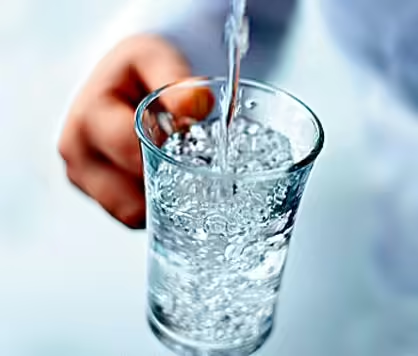Our body is 60% water, and muscles are even 80%. Glycogen is a source of energy, ¾ of which is water, and its lack affects its quantity. Protein will not be absorbed without water either. It is believed that drinking plenty of fluids during training helps prevent kidney stones. Drink! But do not forget to monitor the quality of the water you consume. Here are the basic rules that should be emphasized when consuming water.
– in our life, as a rule, there is no clean water at hand. Therefore, we need to carry it with us!
– half an hour to an hour before training you need to drink up to half a liter of water.
– during training or any other active physical activity, water should be consumed evenly, approximately 100 grams every 15-20 minutes.
– after finishing the training you should drink half a liter of water.
– during the day, focus on your desire to drink and do not force yourself to drink too much, this is also not very useful – it increases the load on both the cardiovascular system and the kidneys.
– food should also be cooked in clean water, even if it is not consumed after cooking.
– It is better to drink water at room temperature. Cold water is less digestible, and in the cold season it is even better to additionally heat the water.
– It is advisable to drink water 15-30 minutes before a meal and not earlier than 40-50 minutes after. This promotes proper breakdown of food in the gastrointestinal tract. In other words, water does not interfere with the gastric juice grinding food, diluting its concentration. Even if you want to drink during a meal, try to get rid of this habit, otherwise you risk earning disorders of the entire digestive system in the future. Especially considering that bodybuilders eat much more than ordinary people and these disorders will become more noticeable in the near future.
– taking sports nutrition in the form of powders ( gainer , protein mixtures , creatine , etc.) also increases the body’s need for water. Therefore, the amount of water with which you dilute all these mixtures should not be taken into account when calculating the total amount of pure water you consume during the day.
– to calculate your water consumption rate, you can use a simple formula – this is your weight in kilograms, divided by 20. The answer will be in liters. In other words, if an athlete weighs 88 kilograms, his norm is 88/20 = 4.4 liters.
So, what makes water stand out from the rest of the elements that make up our body?
It is difficult to describe how important the function of water is in our body, since it is actually made of water! Water is a solvent for vitamins, macro- and microelements! The bulk of the cell is water, the soup in which life is cooked!
Thermoregulation.
Only about 25% of the energy produced by muscles is spent on work. The remaining 75% is converted into heat! And it is very important to remove this heat from the source of formation in time, otherwise local overheating and disruption of metabolic processes are possible, or even tissue destruction. We all know that at a temperature of 42 degrees, protein begins to break down. Due to the circulatory system, this excess heat is actively distributed throughout the body, brought to its surface, and is released into the environment due to the fact that we sweat and our sweat, evaporating, takes away excess energy.
Without sufficient water consumption, fat burning processes slow down. In such conditions, the kidneys often shift the burden of removing “garbage” from the body to the liver. And the liver, in turn, stops converting fat into energy and is engaged in cleansing the body of “slags”, which they cannot provide to a sufficient extent almost in conditions of water deficiency.
This is especially important in carbohydrate-free and low-carbohydrate diets, when the body receives energy mainly from proteins, of which much more is consumed than usual. A large amount of water is needed to remove toxins formed as a result of protein breakdown.
Muscular strength and mental concentration.
In many ways, how your workout will go depends on your water-salt balance. With a lack of water, the concentration of minerals such as potassium, calcium, magnesium, chlorine, responsible for the formation of electrolytes necessary for the body, drops. As a result, nerve impulses sent to the muscles experience greater resistance, passing through nerve fibers and the muscles no longer receive signals of the intensity that you would like to count on. And it turns out that you quickly get out of breath or cannot lift your usual working weight at all.
During prolonged aerobic exercise, profuse sweating can change the blood density, which is dangerous in itself. This can very easily provoke absolutely always undesirable thrombosis, and as a result – a stroke or even a heart attack. Therefore, it is necessary to constantly compensate for the loss of fluid during training!
Lubrication of joints
Water forms the composition and quantity of synovial fluid, which directly affects the work of our joints. What happens when there is a lack of lubrication between actively rubbing surfaces? That’s right – they wear out much faster. The result is injuries and pain, after which training becomes painful and generally meaningless, if we are talking about training for an amateur who does not need results at the cost of his own health.
If we talk abstractly from sports, then water to some extent is our health! Remember the first recommendations of doctors when you start to get sick – drink plenty of fluids! Water helps to speed up metabolic processes, wash out toxins – products of the destructive activity of viruses and bacteria.
Drink water and be healthy!






